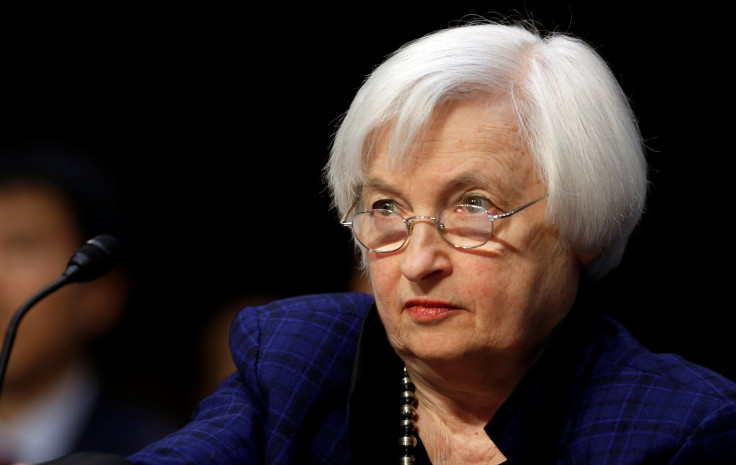Will The Federal Reserve Raise Interest Rates In December? Chair Janet Yellen Signals An Increase Despite Uncertainty Of Trump Presidency

Federal Reserve Chair Janet Yellen signaled Thursday a likely hike of the central bank's interest rate target after its monetary policy arm meets Dec. 14. Speaking before the Congressional Joint Economic Committee, she also expressed worry about the uncertainty of the next four years under President-elect Donald Trump.
In her testimony Thursday morning, Yellen pointed to healthy economic indicators, such as a stable unemployment rate below 5 percent, average job gains of 180,000 per month since January and an inflation rate heading toward the Fed’s 2 percent goal, as reasons the interest rate target — also called the federal funds rate — might be ripe for its first increase since December 2015.
She cautioned that delaying a rate hike and facilitating faster economic growth for too long could allow the market to spin out of control. In that scenario, the Fed would need to put on the brakes, which could lead to a negative economic shock.
“Were the FOMC to delay increases in the federal funds rate for too long, it could end up having to tighten policy relatively abruptly to keep the economy from significantly overshooting both of the Committee's longer-run policy goals,” Yellen said, using an acronym for the Federal Open Market Committee, the entity that sets the central bank’s monetary policy.
But in a question-and-answer session with the committee, Yellen appeared to backtrack.
Rep. Carolyn Maloney, D-N.Y., asked if Yellen might delay the interest rate increase in light of the economic uncertainty surrounding Trump’s incoming administration. President-elect Trump’s Nov. 8 victory initially sent expectations for an interest rate raise down because of expections of a volatile market under his leadership.
In response to Maloney, the Fed chair predicted that the future of the U.S. economy would remain murky. “My guess is that uncertainty about these matters will last for some considerable time, and we have had an accommodative monetary policy,” Yellen said, adding that she still found the Federal Open Market Committee's decision last month to delay a hike in interest rates "appropriate."
The federal funds rate, which is the rate at which banks lend to one another in the short term, affects the rise and fall of other interest rates, like those associated with bonds and mortgages. The Federal Open Market Committee can stimulate the economy by dropping the rate — and therefore incentivizing more borrowing and investment in homes and commercial capital — or tame it by raising the rate — and therefore incentivizing more saving and less spending.
Currently, the Fed’s target for the federal funds rate is between 25 and 50 basis points, or between 0.25 and 0.50 percent.
The Fed decided against raising its rate target at the start of November, but Yellen said the committee’s choice didn’t mean economic indicators were too weak to warrant tighter monetary policy — only that a faster pace of job growth and inflation was needed before the central bank could begin to rein in the American economy.
“Waiting for further evidence does not reflect a lack of confidence in the economy,” she said Thursday.
Analysts surveyed by the CME Group pegged the chances of a rate hike at the end of the Fed’s December meeting at more than 90 percent. And, as Bloomberg reported, expected probability of a rate hike eventually rose in the days following its initial election night drop — this time, to nearly 100 percent.
Even Eric Rosengren, the historically accommodative president of the Federal Reserve bank in Boston, argued for a rate hike on Tuesday.
“Absent significant negative economic news over the next month," he said in a speech before the Portland Regional Chamber of Commerce, "the market’s assessment of the likelihood of tightening in December seems plausible.”
© Copyright IBTimes 2024. All rights reserved.






















